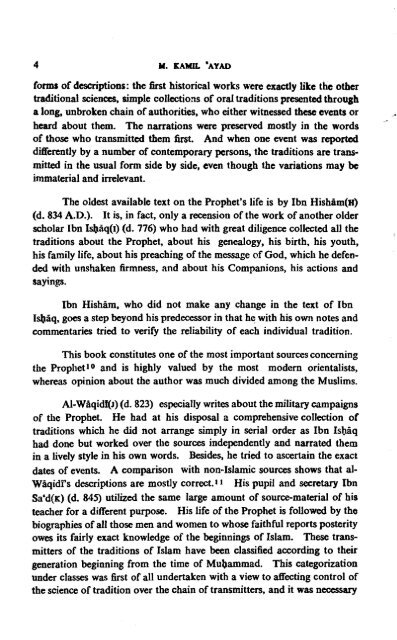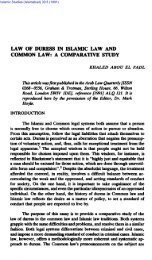THE BEGINNING OF MUSLIM HISTORICAL RESEARCH*
THE BEGINNING OF MUSLIM HISTORICAL RESEARCH*
THE BEGINNING OF MUSLIM HISTORICAL RESEARCH*
Create successful ePaper yourself
Turn your PDF publications into a flip-book with our unique Google optimized e-Paper software.
forms of descriptions: the first historical works were exactly like the other<br />
traditional sciences, simple collections of oral traditions presented through<br />
a long, unbroken chain of authorities, who either witnessed these events or<br />
heard about them. The narrations were preserved mostly in the words<br />
of those who transmitted them first. And when one event was reported<br />
differently by a number of contemporary persons, the traditions are trans-<br />
mitted in the usual form side by side, even though the variations may be<br />
immaterial and irrelevant.<br />
The oldest available text on the Prophet's life is by Ibn his him(^)<br />
(d. 834 A.D.). It is, in fact, only a recension of the work of another older<br />
scholar Ibn I&aq(~) (d. 776) who had with great diligence collected all the<br />
traditions about the Prophet, about his genealogy, his birth, his youth,<br />
his family life, about his preaching of the message of God, which he defended<br />
with unshaken firmness, and about his Companions, his actions and<br />
sayings.<br />
Ibn Hishiim, who did not make any change in the text of Ibn<br />
Isl~iiq, goes a step beyond his predecessor in that he with his own notes and<br />
commentaries tried to verify the reliability of each individual tradition.<br />
This book constitutes one of the most important sources concerning<br />
the Prophetlo and is highly valued by the most modem orientalists,<br />
whereas opinion about the author was much divided among the Muslims.<br />
Al-Wlqidl(~) (d. 823) especially writes about the military campaigns<br />
of the Prophet. He had at his disposal a comprehensive collection of<br />
traditions which he did not arrange simply in serial order as Ibn IsS9q<br />
had done but worked over the so~uces independently and narrated them<br />
in a lively style in his own words. Besides, he tried to ascertain the exact<br />
dates of events. A comparison with non-Islamic sources shows that al-<br />
Wiiqidi's descriptions are mostly correct.] l His pupil and secretary Ibn<br />
Sa'd(~) (d. 845) utilized the same large amount of source-material of his<br />
teacher for a different purpose. His life of the Prophet is followed by the<br />
biographies of all those men and women to whose faithful reports posterity<br />
owes its fairly exact knowledge of the beginnings of Islam. These transmitters<br />
of the traditions of Islam have been classified according to their<br />
generation beginning from the time of Muhammad. This categorization<br />
under classes was first of all undertaken with a view to affecting control of<br />
the science of tradition over the chain of transmitters, and it was necessary
















